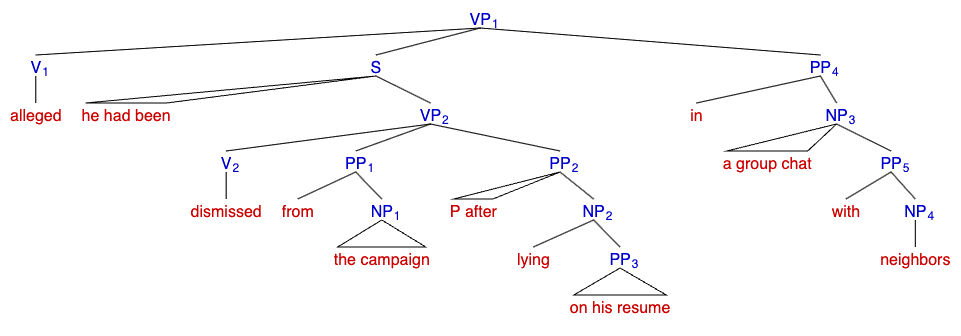PP attachment ambiguity of the day
« previous post | next post »
Chrisma Madarang, "Man Accusing CPAC Chair Matt Schlapp of Sexual Assault Was Paid $480,000: Report", Rolling Stone 3/27/2024:
Huffman claimed Mrs. Schlapp attempted to “impugn” his character in her response to the allegations against her husband, calling him a “troubled individual,” and alleged he had been dismissed from the campaign after lying on his resume in a group chat with neighbors.
That sentence ends with a sentence "he had been dismissed" embedded as the complement of the verb "alleged", followed by five consecutive prepositional phrases
- from the campaign
- after lying
- on his resume
- in a group chat
- with neighbors
A simplified version of the (I think) correct tree structure for those final 19 words is something like this:
But there are many alternative parses, including the tangled web at the end of the first garden path I took, which featured the idea that Huffman lied on his resume in a group chat with neighbors. Which was hard to make sense of, since such chats don't involve the exchange of resumes, at least in any neighborhood I've ever lived in.
I leave it as an exercise for the reader to see what part of the full sentence your favorite LLM thinks that "in a group chat with the neighbors" modifies.

Russinoff said,
March 28, 2024 @ 5:11 pm
I didn't even get that far into the sentence; I'm still trying to identify the subject of "calling" and the antecedent of "him".
J.W. Brewer said,
March 28, 2024 @ 6:10 pm
Wouldn't the unambiguous rephrasing be something like "alleged in a group chat with neighbors that [he/Huffman] had been dismissed from the campaign after lying on his resume." There are two different generally relevant things you might want to know about a statement alleged to be defamatory: (1) where, when, by what means, and/or to whom it was (allegedly) made; (2) what its (alleged) substance was. At least here, putting those bits of information in that order avoids an ambiguity that the other order might create. You might also note that "allege" is a suboptimal verb here because it's easy to get muddled between the allegations of the plaintiff's court filing and the defendant's allegedly defamatory statements – the defendant's alleged allegations, you might say. The verb "claim" has the same unhelpful potential ambiguity. Better would be something like "Huffman alleged that Mrs. Schlapp falsely stated in a group chat with neighbors that he had been dismissed from the campaign after lying on his resume" would be clearer. (I think it's clear in context that the reporter is not reporting that Mrs. Schlapp's alleged statement was in fact false but is reporting that Huffman is alleging it was false.)
Separately, the lack of parallelism between the past tense of "alleged he had been" and the present progressive of the preceding "calling him a" is not helpful.
magni said,
March 28, 2024 @ 9:53 pm
As a non-native speaker, I feel vindicated reading this post.
Jonathan Smith said,
March 29, 2024 @ 7:20 am
IMO the main confusing thing is that the natural reading "Person A claimed X and alleged Y" is wrong; instead (apparently) it's Person A claimed [Person B (attempted X and alleged Y)]
Mike Anderson said,
March 29, 2024 @ 8:57 am
Chrisma Madarang needs to sue all her writing and English composition teachers for gross malpractice, C.M. should also participate in mandatory remedial training in the use of commas and short sentences.
gds555 said,
March 29, 2024 @ 1:00 pm
The surnames don’t help: as I read the passage, I find my brain getting scrambled by vague notions that some man got into a huff, and also that some person schlapped somebody.